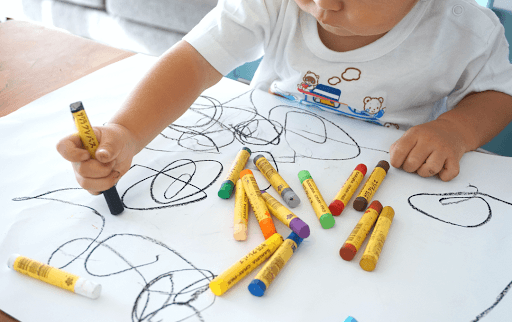Effective Practice in Early Years
The Key EYFS Elements and Principles
Early years practitioners play a critical role in supporting the growth and development of young children. To provide high-quality care and education, practitioners must possess vital elements of effective practice. In this article, we will explore the principles and themes of the Early Years Foundation Stage (EYFS) and how they inform effective practice in the early years.
What is Effective Practice?
Effective practice refers to utilising knowledge and skills to attain optimal outcomes for individuals, particularly children.
It involves implementing evidence-based techniques and methods rooted in research and adaptable to meet each individual’s distinctive requirements. The effective practice covers activities such as play-based learning, observation, assessment, planning, and evaluation.

The Principles and Themes of the EYFS
 The principles and themes of the EYFS provide a comprehensive framework for early years education and childcare in England. The EYFS outlines seven areas of learning and development: communication and language, physical development, personal, social, and emotional development, literacy, mathematics, understanding the world, and expressive arts and design, all interconnected and contribute to children’s holistic development.
The principles and themes of the EYFS provide a comprehensive framework for early years education and childcare in England. The EYFS outlines seven areas of learning and development: communication and language, physical development, personal, social, and emotional development, literacy, mathematics, understanding the world, and expressive arts and design, all interconnected and contribute to children’s holistic development.
The EYFS ensures that all early years providers meet the statutory standards for young children’s learning, development, health, and safety in their care. They also provide high-quality care and education tailored to each child’s needs and interests.
The themes of the EYFS are each essential component of high-quality early years education and childcare in England. Here is a breakdown of each of the themes:
A Unique Child:
Every child is unique, which is the focus of the “A Unique Child” theme in early childhood education. This theme emphasizes the importance of recognizing and valuing each child’s individuality, including the characteristics and experiences that are unique to them within the context of their family and community.
It also emphasises the need to promote each child’s self-esteem and confidence and support their learning and development in a way tailored to their unique needs and interests. This theme highlights the importance of treating each child individually, recognizing that they are equally capable and in constant development.
By promoting each child’s unique strengths and interests, early childhood educators can help them reach their full potential.
Positive Relationships:
Positive Relationship is an essential theme that emphasizes the need for practitioners to build strong, positive relationships between children and their caregivers and among children themselves.
This theme emphasizes creating a welcoming, inclusive environment where children can thrive. Practitioners should establish warm, responsive, and trusting relationships with children and their families and work to create a supportive and nurturing environment where children can feel safe, secure, and valued.
To build positive relationships, practitioners should communicate openly and honestly with parents and caregivers and involve them in their child’s learning and development as much as possible.
Enabling Environments:
Enabling Environments is a critical theme in early years education, emphasizing the significance of creating an environment that supports and stimulates children’s learning and development.
This theme involves practitioners providing a range of resources and materials that are accessible, safe, and suitable for children of varying ages, abilities, and interests.
In addition, practitioners must also create spaces that promote exploration, creativity, and independent learning and challenge children to develop new skills and knowledge.
By prioritising the creation of enabling environments, practitioners can encourage children to engage in learning and play, develop their confidence and self-esteem, and support their overall growth and development.

Learning and Development:
Learning and development is a central theme in the Early Years Foundation Stage (EYFS), highlighting the seven areas of learning and development that are essential for young children.
These areas include communication, language, physical, personal, social, emotional development, literacy, mathematics, understanding the world, and expressive arts and design.
The theme stresses the importance of creating engaging and varied learning experiences that support children’s development in all these areas and are tailored to their unique needs and interests. Early years practitioners must provide children with opportunities to explore, discover, and learn through play and support them in developing their skills, knowledge, and understanding across all areas of learning and development.
By providing a rich and stimulating learning environment and using effective teaching strategies, early years practitioners can help children to achieve their full potential and prepare them for a successful transition to primary school.
The principles of the EYFS serve as the foundation for high-quality early years education and childcare in England. Here is a breakdown of each of the principles:
- Every Child is Unique: This principle acknowledges that every child has unique needs, interests, and abilities. It emphasizes the importance of valuing and celebrating each child’s individuality and supporting their learning and development in a way tailored to their needs.
- Children Learn Through Play: This principle recognizes that play is vital to learning and development. It highlights the importance of providing children with opportunities for open-ended, exploratory play that allows them to experiment, discover, and learn through their own experiences and interactions with others.
- Partnership with Parents and Carers: This principle emphasizes the importance of building positive relationships with parents and carers and involving them in their child’s learning and development. It recognizes that parents and carers are the first and most important educators of their children and that working in partnership with them can enhance children’s learning and development.
- Inclusion: This principle stresses the importance of providing an inclusive environment that values and respects diversity and promotes equal opportunity for all children. It recognizes that every child can participate fully in all aspects of early years education and childcare, regardless of background or circumstances.
- Holistic Development: This principle recognizes that children’s learning and development are interconnected and encompasses all areas of their life. It emphasizes the importance of supporting children’s physical, cognitive, emotional, and social development in a way that promotes their overall well-being.
- Continuity of Learning and Development: This principle recognizes the importance of providing a seamless transition between the early years of education and childcare stages. It emphasizes the need for practitioners to collaborate and share information to ensure that children’s learning and development are continuous and uninterrupted.
- Secure, Safe, and Stimulating Environment: This principle stresses the importance of providing a safe, secure, and stimulating environment that supports children’s learning and development. It recognizes that children must feel safe and secure to learn and explore freely in their environment.
Early Years Practice: Key Elements of Effective Practice
 Early years practice that supports health and well-being is a fundamental component of high-quality practice. Practitioners need to create a safe, secure, and healthy environment that promotes children’s physical, emotional, and mental health. They require a deep understanding of nutrition, physical activity, health, and safety policies and procedures and the ability to implement them effectively.
Early years practice that supports health and well-being is a fundamental component of high-quality practice. Practitioners need to create a safe, secure, and healthy environment that promotes children’s physical, emotional, and mental health. They require a deep understanding of nutrition, physical activity, health, and safety policies and procedures and the ability to implement them effectively.
The effective practice also involves:
- They are building positive and responsive relationships with children and their families.
- It provides a rich and stimulating learning environment that fosters exploration and discovery.
- I am using assessment and observation to continuously monitor and evaluate children’s progress and tailor learning experiences to meet the diverse needs of each child.
By prioritising health and well-being in early years practice, practitioners can support the optimal development of young children and lay a strong foundation for their lifelong learning and success.
Conclusion
Effective practice is an essential aspect of high-quality early years education and childcare.
To be effective, practitioners must possess critical elements of practice, including knowledge of the principles and themes of the EYFS and strategies to support children’s health and well-being. By creating a nurturing, stimulating, and inclusive learning environment, practitioners can support the holistic development of young children and help them reach their full potential.
FREQUENTLY ASKED QUESTIONS
Q: What is effective practice in the early years?
A: Effective practice in early years refers to teaching and caregiving practices that promote children’s learning, development, and well-being. It involves using evidence-based approaches and strategies grounded in research and tailored to meet each child’s unique needs and interests.
Q: What are some critical elements of effective practice in the early years?
A: Key elements of effective practice in early years include creating a safe and nurturing learning environment, building positive relationships with children and families, providing engaging and developmentally appropriate learning experiences, and using assessment and observation to inform teaching and caregiving practices.
Q: What are some principles of effective practice in the early years?
A: Principles of effective practice in early years include promoting children’s social-emotional development, supporting children’s language and literacy development, providing opportunities for play and exploration, using responsive caregiving practices, and promoting cultural responsiveness and inclusion.
Q: How can early years practitioners implement effective practice?
A: Early years practitioners can implement effective practice by staying up to date on current research and best practices, creating a positive and inclusive learning environment, building strong relationships with children and families, providing engaging and developmentally appropriate learning experiences, and using assessment and observation to inform teaching and caregiving practices.
Q: Are there resources available to support effective practice in the early years?
A: Yes, there are many resources available to support effective practice in the early years, including the Head Start Early Learning Outcomes Framework (ELOF) Effective Practice Guides, which provide information about domain-specific teaching practices that support children’s development. Other resources include professional development opportunities, mentoring and coaching, and peer networks and communities of practice.



